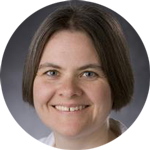
Training in a Pandemic: Two Residents Share their Experiences
Photo above: (Left) Emergency medicine resident Lauren Coaxum, MD (left), with Assistant Professor Stephanie Eucker, MD, PhD (center), and resident Daniel Mercader, MD (right). (Right) General surgery resident Anthony Saxton, MD (center), with residents Maria Xu, MD (left), and Aurian "Auri" García-González, MD (right). | Photo credit: Lauren Coaxum, MD, and Anthony Saxton, MD.

Emergency Medicine Resident
For most residents, donning their “MD” embroidered white coats for the first time is a significant accomplishment, and expectations for a positive training experience are high. What happens when this milestone is overshadowed by an ongoing pandemic that continues to radically shift the healthcare landscape?
Two junior residents, Lauren Coaxum, MD, and Anthony Saxton, MD, share their stories of what led them to Duke, and how the pandemic has altered their residency training experience.
Different Paths to Residency
Ten years ago, Anthony Saxton, MD, was finishing his undergraduate degree when he participated in a learning semester in Nicaragua. Until then, he had a clear vision of his future as a certified public accountant.

General Surgery Resident
The trip, however, planted a seed that eventually changed his mind.
“It changed my whole perspective of what I wanted my future to be,” Dr. Saxton says. “I spent time working in an orphanage for individuals with disabilities, and I got to see the impact of their caregivers and interactions with therapists, doctors, and nurses. It really resonated with me and fueled a passion for improving the health of others.”
Now, a decade after returning from Nicaragua, Dr. Saxton is a first-year resident in Duke’s general surgery residency program.
For second-year emergency medicine resident Lauren Coaxum, MD, pursuing a career in medicine was always her goal. When she was about five years old and living in southern New Jersey, she had a pediatrician who was a Black woman.
“I remember looking at her and realizing that I wanted to be like her when I grew up,” says Dr. Coaxum. “I didn’t realize how rare it was for a Black woman to be in medicine. Only two percent of physicians right now are Black women. It was amazing to be seen and cared for by one of the two percent.”
Although she originally wanted to be a pediatrician, Dr. Coaxum realized that emergency medicine offered versatility that would allow her to see a variety of patients. She matched with Duke and began her residency during the first months of the pandemic.
Finding New Ways to Connect
By the time Dr. Coaxum and Dr. Saxton arrived at Duke in 2020 and 2021, respectively, hospital protocols had changed dramatically.
Due to visitor restrictions, Dr. Coaxum says she had to serve as a link between patients in the ICU and their friends and family. When her own family suffered a devastating loss due to COVID-19, she gained a deeper sense of empathy and understood how vital it was to find new ways of connecting patients with their loved ones.
“It definitely made me not take things for granted, or to take communication with family for granted,” she says. “We thankfully were able to use technology and video calls, and I think it helped with a lot of decision making and with processing what was happening.”
“I think we've been stretched in ways that we didn't know that we could be. People have had to get closer together in different ways, and we’ve been able to acknowledge our need for community. We’re still here, we’re still doing the work, and we’re still caring for patients.”
— Dr. Lauren Coaxum, Emergency Medicine Resident
Building Resilience and Maintaining Balance

General Surgery Residency
Program Director
Duke Health’s core value is “Caring for Our Patients, Their Loved Ones, and Each Other.” The last tenant—caring for each other—has been an important lesson for trainees during the pandemic, the residents say.
"The pandemic has caused us to recognize that we do have to value our own health and well-being,” says Dr. Saxton. “Program leadership has really driven that. Our new [general surgery residency] program director, Dr. Elisabeth Tracy, has done an excellent job at emphasizing that we need to take care of ourselves and our families to be able to provide the best care for our patients.”
Dr. Coaxum says she has found great support from her fellow residents and faculty members, including emergency medicine residency program director Dr. Joshua Broder.

Emergency Medicine Residency
Program Director
“I’ve made great friends in my program, so it’s about finding safe and good ways to connect with them and share our experiences,” she says. “Our faculty members have been great as well: I’ve been able to talk with them about my fears and challenges, and they’ve helped me to figure out ways that I can learn, and take care of my patients well, and grow as a resident.”
Time Earned, Lessons Learned
Both residents feel that whatever happens in the future, the pandemic will have a lasting impact on healthcare and residency training, in mostly positive ways.
For Dr. Coaxum, the pandemic has proven the value of community in the training experience. “I think it’s making us reconsider the way that our healthcare is structured,” says Dr. Saxton. “What lessons are we learning as we adapt to constant change, and how can we change the way we deliver healthcare to make it a better experience for patients?”
“I think we've been stretched in ways that we didn't know that we could be,” says Dr. Coaxum. “People have had to get closer together in different ways, and we’ve been able to acknowledge our need for community. We’re still here, we’re still doing the work, and we’re still caring for patients.”
Give to Duke Surgery
A gift to the Department of Surgery is a gift of knowledge, discovery, and life.